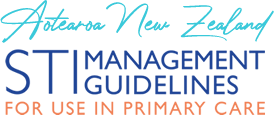- Thousands of visitors and workers in Aotearoa New Zealand are not eligible for publicly funded health services. These ineligible patients may include tourists, international students, seasonal workers and many others
- Visitors to Aotearoa New Zealand may have different knowledge about and attitudes to sex, may have different rates of sexually transmitted infections (STIs) in their home countries, and may not know how to access information and sexual health services in Aotearoa New Zealand
- Screening and treatment for STIs is usually an exclusion on medical insurance policies, and can be expensive
- In Aotearoa New Zealand, regardless of residency status, a person who has, or is suspected of having, an infectious disease specified in Schedule 1 (parts 1 and 2) of the Health Act is eligible under the Health and Disability Services Eligibility Direction 2011, to receive funded services to the extent appropriate in the circumstances to address risks to other persons
- These services can include all or any of the following: surveillance, diagnosis, treatment, follow up and contact tracing
- Infectious diseases relevant to sexual health in this context include chlamydia, gonorrhoea, syphilis, HIV and AIDS, herpes simplex, non-specific urethritis, genital warts, lymphogranuloma venereum (LGV), chancroid and scabies
- Contacts of people with these STIs, or those with suggestive symptoms are included
- Reciprocal health agreements exist between Aotearoa New Zealand, the United Kingdom (UK) and Australia. In addition to eligibility under the Health and Disability Services Eligibility Direction 2011 above, testing and treatment for an STI or STI-related symptoms would be funded if a medical practitioner believes the patient requires medical treatment and prompt attention. There is a considerable element of discretion on the part of the provider
- As per sexual health check guideline
- If the patient is usually not eligible for funded health care, but is eligible for funded STI testing under the Health and Disability Services Eligibility Direction 2011 or reciprocal health agreement (see overview), this must be stated on the laboratory request form
Clinical indicators for testing
- Rationalise required testing, which can be expensive for the patient in situations where this is not publicly funded. Avoid testing which is not expected to change patient management
- Costs of testing and treatment options should be considered with the patient, if not publicly funded
- Any consultations or management in relation to a sexual assault which occurred in Aotearoa New Zealand will be covered by the Accident Compensation Corporation (ACC)
- An interpreter may be required, but may increase costs for the patient if not eligible for publicly funded care. It may not be appropriate to use family members or partners as interpreters. Phone translation apps can be helpful
Even if all test results are negative, use the opportunity to:
- Educate about condom use and risk minimisation
- Discuss and activate reminders for regular screening tests according to risk
- Provide information about STIs and how to access sexual health services in Aotearoa New Zealand
- Discuss contraception if warranted

